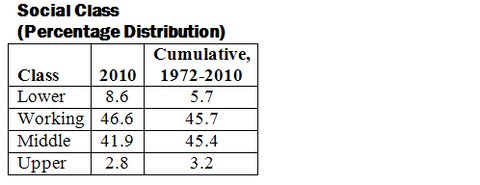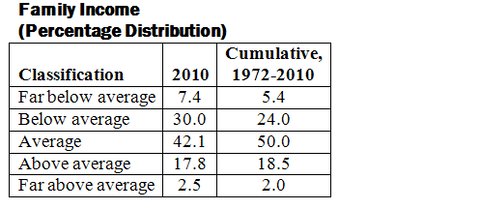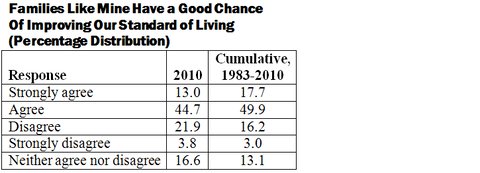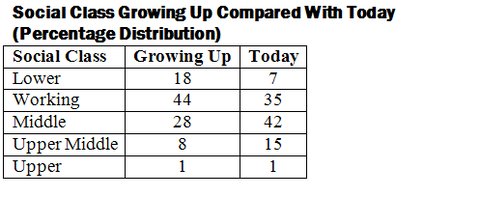A new academic study concludes that poll questions about expectations – which ask people whom they think will win – have historically been better guides to the outcome of presidential elections than traditional questions about people’s preferences. From my article about the study, by David Rothschild and Justin Wolfers, and the reaction to it:
Most recently, Mitt Romney won the Republican nomination despite at various points trailing other candidates — Rick Santorum, Newt Gingrich, Herman Cain, Rick Perry — in polls of Republican voters’ preferences. Even when Mr. Romney was behind, Republicans typically told pollsters that they expected him to win the nomination….
In presidential races since 1952, the expectations question has pointed to the winner in 81 percent of states, based on data from the American National Election Studies. The question about voting intentions pointed to the winner in 69 percent.
Below is a lightly edited interview with Mr. Wolfers, conducted by e-mail, focusing on the implications of the study for current presidential polls.
In the article, I discussed only briefly the expectations polls about the 2012 race, and some of the Twitter feedback was eager for more. By my count, there have been five recent major polls asking people whom they expect to win — by ABC/Washington Post, Gallup, Politico/George Washington University, New York Times/CBS News, and the University of Connecticut. There is also sixth from Rand asking people the percentage chances they place on each candidate winning. How consistent are the polls?
There’s a striking consistency in how people are responding to these polls. The most recent data are from the Gallup poll conducted Oct. 27-28, and they found 54 percent of adults expect Obama to win, versus 34 percent for Romney. Around the same time (Oct. 25-28), there was a comparable New York Times/CBS poll in which 51 percent of likely voters expect Obama to win, versus 34 percent for Romney.
But these results aren’t just stable across pollsters, they’ve also been quite stable over the past few weeks, even as the race appeared to tighten for a while. Politico and George Washington University ran a poll of likely voters on Oct. 22-25, finding 54 percent expect Obama to win, versus 36 percent for Romney. The University of Connecticut/Hartford Courant poll of likely voters got a somewhat higher share not venturing an answer, with 47 percent expecting Obama to win versus 33 percent for Romney. Finally, the ABC/Washington Post poll of registered voters run Oct. 10-13 found 56 percent expect Obama to win, compared to 35 percent for Romney.
I’m rather surprised by the similarities here – across time, across pollsters, across how they word the question, and across different survey populations (likely voters, registered voters, or adults) – but I suspect that is part of the nature of the question. You just don’t see the noise here that you see in the barrage of polls of voter intentions, which are extremely sensitive to all of these factors.
I always throw out the folks who don’t have an opinion, and count the proportions as a share of only those who have an opinion. By this measure, the proportion who expect Obama to win is: 61 percent (Gallup), 60 percent (The New York Times), 60 percent (Politico), 59 percent (Hartford Courant), 62 percent (ABC). The corresponding proportions who expect Romney to win are: 39 percent, 40 percent, 40 percent, 41 percent and 38 percent. Taking an average across all these polls: 60.3 percent expect Obama to win. Or if you prefer that I focus only on the freshest two polls, 60.7 percent expect him to win.
The results do seem have tightened somewhat since the first debate, which Romney was widely seen to have won, right? Do the patterns — or lack of patterns — in the numbers help solve the issue of what most people are thinking of when they answer the expectation question: Private information (their friends’ voting plans, yard signs in their neighborhood, etc.) or public information (media coverage, speeches, etc.)?
The results of the polls of voter intentions seem to have tightened a bit since the first debate. There’s an interesting school of thought in political science that basically says: voters are pretty predictable. But they don’t think too hard about how they’re going to vote until right before the election. So what happens is that public opinion through time just converges to where it “should” be. And viewed through this lens, the first debate was just an opportunity for people who really should always have been in Romney’s camp to figure out that they’re in Romney’s camp.
So why did the expectations polls move less sharply than intentions polls? One possibility is that your expectations are explicitly forward-looking, and perhaps people saw the race tightening as they saw that some of the support for Obama was a bit soft. Let me put this another way: There are two problems with how we usually ask folks how they plan to vote. First, the question captures the state of public opinion today, while the expectations question effectively asks you where you think public opinion is going. And second, polls typically demand a yes or no answer, when the reality may be that we know that our support is pretty weak, and it may change, or we aren’t even sure whether we’ll turn up to the polls. The virtue of asking about expectations is that you can think about each of your friends, and think not just about who they’re supporting today, but also whether they may change their minds in the future.
I worry that it sounds a bit like I haven’t answered your question, but that’s because I don’t have a super-sharp answer. If I had to summarize, it would be: expectations questions allow you to think about how the dynamics of the race may change, and so they are less sensitive to that change when it happens.
Based on your research and the current polls, what does the expectations question suggest is the most likely outcome on Tuesday?
If a majority expects Obama to win, then right there, it says that I’m forecasting an Obama victory.
But by how much? Here’s where it gets tricky. The fact that 60 percent of people think that Obama is going to win doesn’t mean that he’s going to win 60 percent of the votes. And it doesn’t mean that he’s a 60 percent chance to win. Rather, it simply says that given the information they have, 60 percent of people believe that Obama is going to win. Can we use this to say anything about his likely winning margin?
Yes. I’ll spare you the details of the calculation, but it says that if 60.3 percent of people expect Obama to beat Romney, then we can forecast that he’ll win about 52.5 percent of the two-party vote. That would be a solid win, though not as impressive as his seven-point win in 2008.
The proportion who expect Obama to win right now looks awfully similar to the proportion who expected George W. Bush to win in a Gallup Poll at a similar point in 2004. Ultimately Bush won 51.2 percent of the two-party vote.
Right now, Nate Silver is predicting that Obama will win 50.5 percent of the popular vote, and Romney 48.6 percent. As a share of the two-party vote, this says he’s forecasting Obama to win 51 percent of the vote. Now Silver’s approach aggregates responses from hundreds of thousands of survey respondents, while I have far fewer, so his estimate still deserves a lot of respect. I don’t want to overstate the confidence with which I’m stating my forecast. So let me put it this way: My approach says that it’s likely that Obama will outperform the forecasts of poll-based analysts like Silver.
We’ll find out soon enough. Thanks.
Article source: http://economix.blogs.nytimes.com/2012/11/02/forecasting-based-on-expectations-not-intentions/?partner=rss&emc=rss









